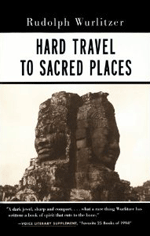 A good travel book makes you feel like you’re there. But, of course, in reality you’re not there. The experiences described belong to the writer, and if you were to travel to the places mentioned your experiences would be unique. This might be especially important to keep in mind when reading spiritual travel books, when the journey is a pilgrimage. Just as we have not physically been to the place that we are reading about, we should be wary to mistake the spiritual insights (or longings) of an author for our own. Travel books are great, but they can’t replace traveling.
A good travel book makes you feel like you’re there. But, of course, in reality you’re not there. The experiences described belong to the writer, and if you were to travel to the places mentioned your experiences would be unique. This might be especially important to keep in mind when reading spiritual travel books, when the journey is a pilgrimage. Just as we have not physically been to the place that we are reading about, we should be wary to mistake the spiritual insights (or longings) of an author for our own. Travel books are great, but they can’t replace traveling.
It was in this spirit that I read Rudolph Wurlitzer’s Hard Travel to Sacred Places (Shambhala Publications, 1994) this past weekend. The book covers Wurlitzer’s trip to Buddhist sites through Thailand, Burma, and Cambodia with his wife, a photographer on assignment, following the death of her 21-year-old son. Though not nearly as good, it’s reminiscent of Peter Matthiessen’s The Snow Leopard—a Buddhist pilgrimage, masked as business trip, following the death of a loved one. [Full disclosure: I’m an obsessive reader of spiritual travel books, often mistaking the spiritual insights and longings of the author for my own. Snow Leopard is one of my favorites in the genre, and saying that Hard Travel isn’t as good does not mean that it isn’t good.]
Hard Travel reads like a raw wound. Wurlitzer’s prose is spare and unfiltered. His grief is naked. An example:
We have survived by cutting our life to the bone. The most ordinary gestures have become the most nourishing; the gaps between thoughts and memories the most necessary. But now, on the road, everything is on the clock. The outside has taken over from the inside, and we don’t have enough spiritual muscle to resist.
At times Hard Travel might feel sophomoric and haphazard, with the lengthy dharma quotes inserted randomly throughout the narrative and snippets from local newspapers. However, as any pilgrim knows, this is exactly what happens on a journey of the heart—everything witnessed is a gift, which is then transformed into a clue that brings you one step closer to whatever it is that you’re looking for. When your eyes are open everything becomes meaningful—the outfit of a tour guide, an advertisement in the local newspaper. Hard Travel is worth reading. The specific descriptions of the crazy places Wurlitzer visits should overshadow the big-picture conclusions that he draws from them. Miraculously, they don’t. It’s a dark book that never tries to be something it’s not—Wurlitzer is broken and never pretends to be enlightened, an easy trap for those who write about the spiritual life.